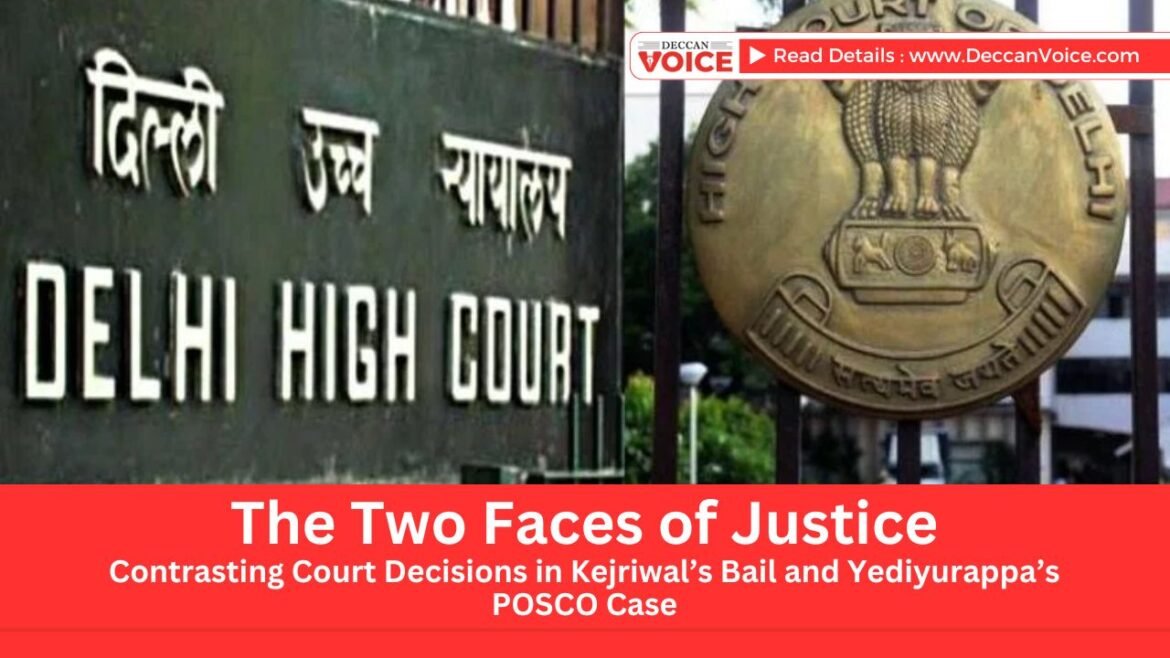The judicial system is often seen as the pillar of democracy, ensuring justice and equality for all. However, recent high-profile cases in India involving political figures have cast a spotlight on perceived inconsistencies within the judiciary. The cancellation of bail for Delhi Chief Minister Arvind Kejriwal and the POSCO case involving former Karnataka Chief Minister B.S. Yediyurappa illustrate the contrasting faces of court decisions, raising questions about judicial impartiality and the influence of political dynamics.
Arvind Kejriwal’s Bail Cancellation
Arvind Kejriwal, the Chief Minister of Delhi and a prominent anti-corruption crusader, has frequently found himself at odds with both political opponents and judicial authorities. In a recent development, a Delhi court canceled his bail in a defamation case filed by a BJP leader. This decision came amid accusations of bias and political vendetta, given Kejriwal’s outspoken criticism of the ruling establishment.
Kejriwal’s legal troubles stem from his fervent anti-corruption stance and his confrontational approach towards political adversaries. The court’s decision to cancel his bail was met with significant public and media attention, with supporters arguing that the judiciary was being used as a tool to silence dissent. Critics of the decision point to a history of legal challenges faced by Kejriwal and his Aam Aadmi Party (AAP), suggesting a pattern of judicial actions aimed at curbing his political influence.
B.S. Yediyurappa and the POSCO Case
In stark contrast, the legal proceedings involving B.S. Yediyurappa, a senior leader of the Bharatiya Janata Party (BJP) and former Chief Minister of Karnataka, have followed a markedly different trajectory. Yediyurappa has been embroiled in several corruption cases, including one under the Prevention of Corruption Act (POSCO). Despite serious allegations and substantial evidence presented in various cases over the years, he has managed to secure favorable court decisions, often avoiding significant legal repercussions.
The POSCO case, in particular, highlighted accusations of preferential treatment within the judicial system. Yediyurappa was accused of illegally denotifying land and receiving kickbacks during his tenure as Chief Minister. However, the courts have repeatedly granted him bail and dismissed key charges, leading to a perception of leniency and political bias.
The Perception of Judicial Bias
The contrasting outcomes in the cases of Kejriwal and Yediyurappa have fueled a debate on judicial impartiality in India. The judiciary is expected to function as an independent entity, free from political influence. However, these cases suggest that political power and influence may sway judicial decisions, undermining public trust in the legal system.
Supporters of Kejriwal argue that his persistent legal challenges are indicative of a targeted campaign to hinder his political career. On the other hand, Yediyurappa’s relatively smooth navigation through legal hurdles is seen by many as evidence of the judiciary’s susceptibility to political clout.
The Impact on Democracy
The perceived double standard in these high-profile cases has broader implications for Indian democracy. The judiciary’s role as a check on executive power is crucial for maintaining a balance of power. When judicial decisions appear inconsistent or biased, it erodes public confidence in the legal system and democratic institutions.
For a democracy to thrive, it is imperative that the judiciary remains steadfastly impartial, ensuring that justice is served without fear or favor. The cases of Arvind Kejriwal and B.S. Yediyurappa underscore the need for greater transparency and accountability within the judicial process. Only then can the judiciary truly uphold the principles of justice and equality enshrined in the Constitution.
Conclusion
The two faces of the court, as seen in the divergent legal journeys of Arvind Kejriwal and B.S. Yediyurappa, highlight critical challenges within the Indian judicial system. As citizens and stakeholders in democracy, it is essential to demand a judiciary that not only appears impartial but also acts with unwavering integrity. The pursuit of justice must transcend political affiliations, ensuring that every individual, regardless of their power or position, is subject to the same legal standards.



